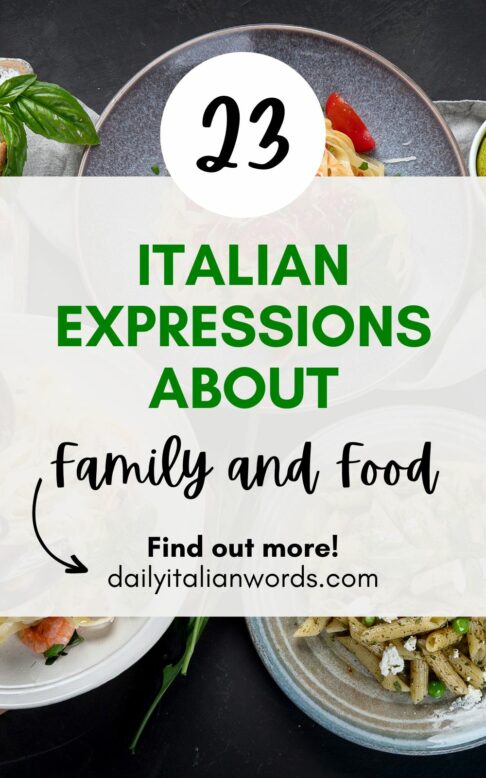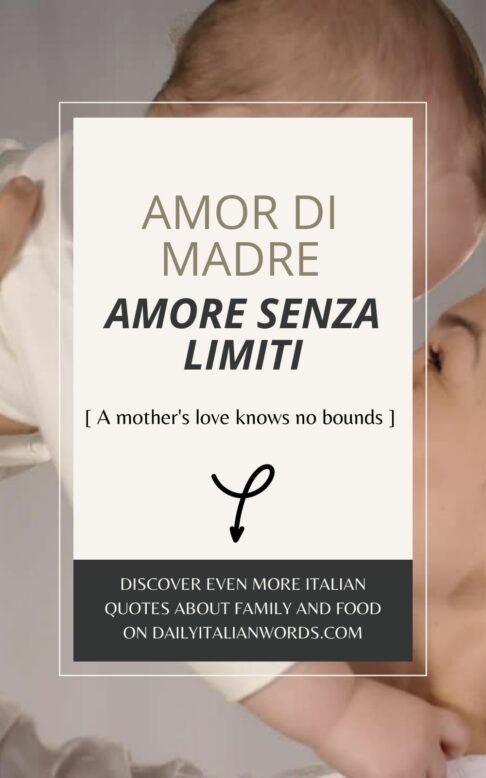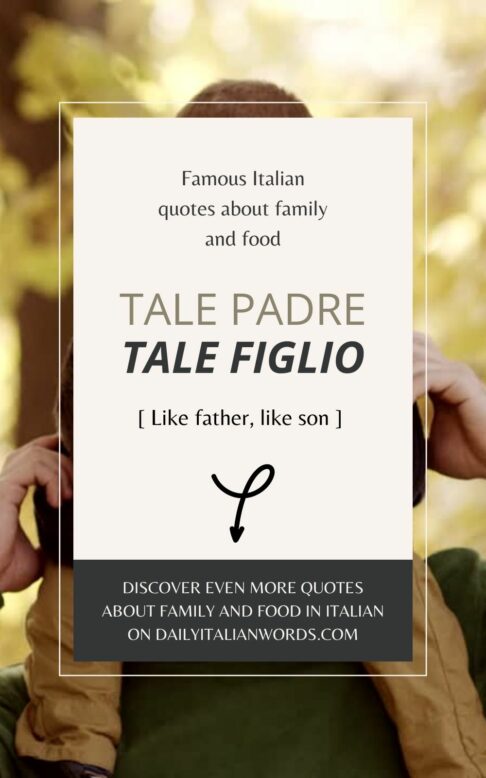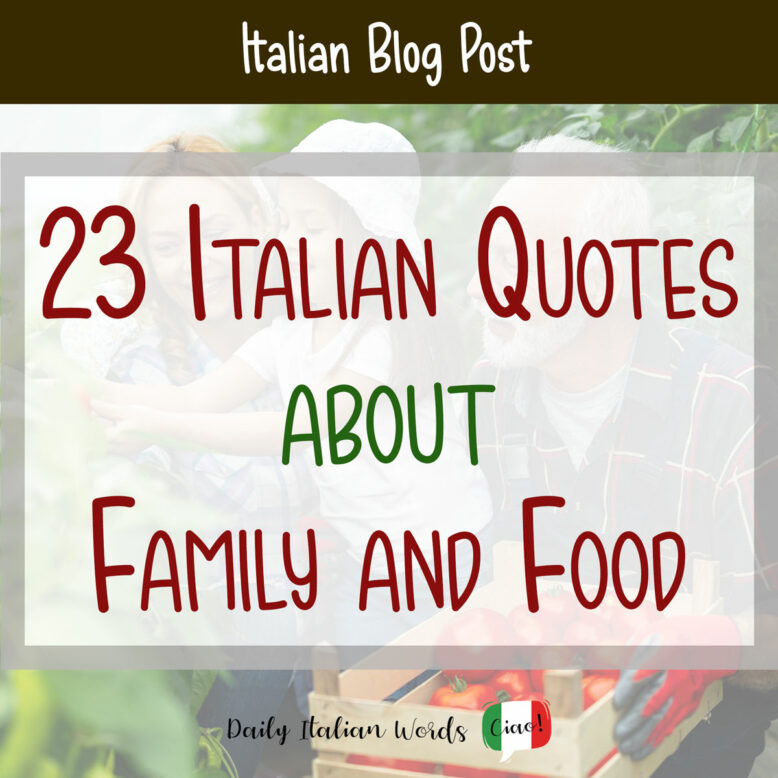It’s no secret that we have a deep appreciation for food and family in Italy. As a result, it’s no surprise that we have many Italian quotes that relate to both!
While these expressions may come across as enigmatic or weird at times, their purpose is to provide insightful guidance and convey wisdom. And they’ve become so ingrained in our culture that you’ll hear them often used in everyday conversation.
So, here are 23 of the most famous Italian quotes and expressions about family and food, with literal translations and meanings.

La famiglia è tutto
Literally: family is everything
This phrase says it all: in Italy, family reigns supreme. Rooted in love, loyalty, and warmth, family is the core of our social fabric, weaving generations together. It’s where traditions flourish, recipes are passed down, and life’s milestones are joyously celebrated. In a word: everything!
Chi vuol vivere e star sano, dai parenti stia lontano
Literally: those who want to live and be healthy, should stay away from their relatives
Ok, so family holds a special place in our hearts, and the bigger it is, the better. Yet, along with the joys of an extended family come the inevitable challenges, often stemming from feelings of envy and jealousy that can sometimes sour relationships. That’s exactly what this Italian quote about family is all about! This dynamic is brilliantly captured in a movie called “Parenti Serpenti” (translated as “Dearest Relatives, Poisonous Relations”) directed by the legendary Mario Monicelli.
Amor di madre, amore senza limiti
Literally: a mother’s love has no limits
This beautiful Italian saying celebrates the unbreakable connection we have with our moms, one that transcends time and distance. Now, we know that the things Italian moms always say to their kids may sometimes come across as a little intense. But that’s just part of their charm!

I panni sporchi si lavano in famiglia
Literally: dirty clothes must be washed at home
When it comes to dirty laundry – aka family issues – we should deal with them privately within the cozy confines of our family fortress. This saying emphasizes the value of sticking together and being discreet, encouraging us to strengthen our family bonds by sorting out our not-so-spotless laundry together right at home.
Tale padre, tale figlio
Literally: like father, like son
As this Italian quote suggests, kids are like mini-mirrors reflecting their parents’ habits and behaviors. So better be mindful of the example they set for their little ones! Another Italian saying that conveys a strikingly similar message is “Buon sangue non mente”, which can be literally translated as “good blood doesn’t lie.” It emphasizes the undeniable truth that parents’ values, traits, and habits are often passed down to their offspring.

Chi si volta e chi si gira, sempre a casa va finire
Literally: whoever turns and whoever turns around, always ends up going home
It’s just something about home, isn’t it? No matter how far we roam or how busy we get with work and life, the longing for home and the familiar never truly fades away and our roots always call us back. Having a stable and comforting place to return to it’s an invaluable source of grounding and a reminder of who we are and where we come from.
L‘affetto verso i genitori è fondamento di ogni virtù
Literally: the affection towards parents is the cornerstone for every virtue
This insightful Italian quote about family highlights that the love we hold for our parents forms the essential foundation for all moral qualities. A generous measure of respect, a dash of heartfelt affection, a touch of unwavering support, and voilà! We have the perfect blend for a virtuous and fulfilling life!

Essere come il prezzemolo
Literally: being like parsley
Have you ever met someone who seems to be always present? Like, in any place and on every occasion? Well, here we say they are like parsley, an herb that seemingly pops up everywhere and is used in countless dishes!
Avere le fette di prosciutto sugli occhi
Literally: to have slices of ham on your eyes
This funny phrase describes a situation so obvious that it’s impossible for someone to miss it. And when someone does miss it, it’s as if they have a blindfold on, with a delicious twist! Here’s an example: “Don’t you see they’re taking advantage of you? Hai le fette di prosciutto sugli occhi?” By the way, we sometimes like to use salame instead of prosciutto and say ‘Hai le fette di salame sugli occhi?”
Essere buono come il pane
Literally: to be as good as bread
In Italy, when you want to describe someone with a kind heart, no phrase fits better than this: “he/she is as good as bread”. The simplicity of bread and its ability to unite people make it the perfect symbol for someone who is truly generous and selfless.
Tutto fa brodo
Literally: everything makes broth
Back in the day, when the broth was all the rage, poor peasants would chuck anything in the pot. Thus, “tutto fa brodo” was born as an idiom to say that when resources are tight, we should use what we have at hand because what really counts is achieving our goal. In simpler terms, every little bit can help.
Mangia che ti passa
Literally: eat and it will pass
Ah, the magical power of a delicious meal to lift our spirits and fill our hearts with joy! “Mangia che ti passa” is a lighthearted Italian quote that playfully urges us to find comfort in food, letting life’s troubles dissolve with every savory bite we take – naturally, always in moderation!
L’amore si misura in piatti cucinati
Literally: love is measured in cooked dishes
Cooking is such an act of love! When we cook for someone, we express our affection through our culinary skills. And the phrase “Love is measured in cooked dishes” perfectly captures how the time, effort, and passion we put into making a meal for someone reflects our feelings for them.
Finire a tarallucci e vino
Literally: to end with tarallucci biscuits and wine
“Finire a tarallucci e vino” is an Italian quote that refers to ending an argument in a friendly manner, often by sharing food and drinks. It comes from the tradition of serving tarallucci (small ring-shaped savory biscuits) and wine to guests as a sign of hospitality. So, if you find yourself resolving a conflict with a friend or colleague over a plate of delicious snacks and a glass of wine, you can say that you’ve “finished with tarallucci and wine” (i.e. ended on a peaceful note)!
Tutto fumo e niente arrosto
Literally: all smoke and no roast
Imagine picking up a book that’s been showered with rave reviews, only to find the plot falls flat. Or encountering someone who’s impeccably dressed and exudes an air of elegance, yet when you engage with them, they reveal a lack of depth. For us, that “tutto fumo e niente arrosto”, meaning they appear promising on the surface but ultimately fail to deliver on their supposed potential. In other words, a letdown.
Il vino fa buon sangue
Literally: wine makes good blood
This Italian saying has been around for centuries, ever since the days of the powerful Roman Empire. And there might be some truth to that! Studies say wine can be good for your heart if you drink it in moderation. So, when you enjoy a glass of wine, not only are you indulging in a guilty pleasure, but you may also be doing your heart a favor. Here’s to your health – cheers!
Non tutte le ciambelle riescono col buco
Literally: not all donuts come out with a hole
We all encounter setbacks and failures in life, it’s totally normal, right? And in Italy, we often use this funny phrase precisely to talk about things that don’t quite go according to plan. By the way, it’s amusing to see how we refer to food in almost every context, it’s an obsession!
Se non è zuppa è pan bagnato
Literally: if it’s not soup, it’s wet bread
This age-old Italian quote illustrates how appearances can be deceiving while the essence of a person or thing remains unaltered. Conjuring images of soup and soaked bread, the saying emphasizes their striking similarity; after all, the very foundation of today’s soup can be traced back to moistened bread.
Parla come mangi
Literally: speak like you eat
We use this expression when we want to tell someone who’s using unnecessarily complicated language that’s hard to understand to speak more straightforwardly, just like how we eat. Think of it as a friendly reproach that’s best used with someone you’re familiar with to encourage them to communicate more clearly.
Fare il provolone
Literally: to act like a provolone cheese
Did you know that in Italian, the word “provolone” is not just a delicious cheese but also a teasing expression to describe a particular kind of man? Yep, we use “Provolone” to refer to someone who’s utterly dedicated to the art of courtship, wooing a woman with constant flattery and excessive compliments. The term “provolone” comes from the Italian word “prova,” meaning “tasting” or “sampling”, and this may have given rise to the use of “provolone” to describe a womanizer who tries to get attention from any woman.
Sei un salame!
Literally: you are a salami!
Among the many Italian quotes about family and food, this one reminds me of my childhood. We often use this phrase, especially with kids, to gently poke fun at them for being careless or making a silly mistake. The phrase is to be used playfully among friends or family. Why the reference to the salami? Interestingly, before the word “salame” referred to the delicious cured pork sausage that we know and love today, it was used to indicate salted fish, also known as “baccalà” in Italian. And “essere un baccalà” is an old-fashioned way of describing someone dull or slow-witted.
Gallina vecchia fa buon brodo
Literally: an old hen makes good broth
You’ll often hear this phrase as a reminder to appreciate the wisdom and experience of those who are older than us, and to acknowledge the value that age can bring to a person’s life. It’s often playfully used also to justify a romantic relationship with an older woman. Its English equivalent is “to age like a fine wine”.
Non essere né carne né pesce
Literally: not being either meat or fish
This expression describes someone or something that lacks a distinct personality or has undefined characteristics. It’s a bit like being stuck in limbo between two distinct states – not quite meat and not quite fish. But beware, using this phrase to describe someone could come across as quite negative.


Valentina Nicastro is a travel writer in love with her home country, Italy. Having travelled widely around the globe, she realised there was more to explore closer to home and decided to put the passport aside for a while. When she is not immersed in documenting Italy, you’ll find her donning her communication consultant hat, weaving words as a content writer and bridging linguistic divides as a translator.


